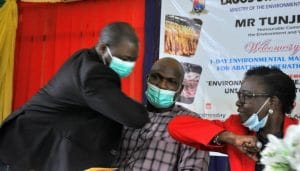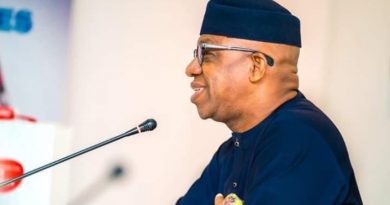Nigeria’s Ngozi Okonjo-Iweala confirmed as WTO chief | World Trade Organization
The World Trade Organization has chosen Nigeria’s former finance minister Ngozi Okonjo-Iweala as its first female and first African leader, handing her the task of restoring trust in a rules-based global trading system.
On Monday, the WTO’s 164 members unanimously selected the 66-year-old development economist and former Nigerian finance minister to serve a four-year term as director general. Okonjo-Iweala will take over the institution, with its budget of $220m and staff of 650, at a critical time.
After four years of bruising battles between Washington and Beijing over protectionist tariffs and import quotas that badly damaged global trade, Okonjo-Iweala is expected to set about bridging a growing divide between the administrations running the world’s first and second largest economies.
Speaking after her appointment, Okonjo-Iweala said her top priority was to ensure the WTO does more to address the coronavirus pandemic, saying members should accelerate efforts to lift export restrictions slowing trade in needed medicines and supplies, and warned of the danger posed by “vaccine nationalism”.
“No one is safe until everyone is safe,” she told Reuters. “Vaccine nationalism at this time just will not pay, because the variants are coming. If other countries are not immunised, it will just be a blowback. It’s unconscionable that people will be dying elsewhere, waiting in a queue, when we have the technology.”
Last year in an interview with the Guardian, she said the pandemic had highlighted dysfunctional trade rules that should be reformed to ensure medical breakthroughs save lives everywhere and not just in the countries where they are developed.
Describing herself as a fighter, she promised to restore the agency’s relevance after its failure to deliver on the promise of trade liberalisation for the benefit of poorer nations. Development and climate change issues will also be at the top her agenda.
Eight candidates had put themselves forward to replace the outgoing chief, Roberto Azevêdo, including the UK’s former trade minister Liam Fox. Okonjo-Iweala remained in the race despite Donald Trump telling the WTO he would veto her appointment.
Ahead of the vote for a new boss, Trump blocked the WTO from appointing appeal judges to arbitrate in disputes, hampering the organisation’s ability to resolve claims of trade abuses.
Joe Biden is know to want greater co-operation at an international level and to reject his predecessors reliance on bilateral confrontations to win trade battles. However, he is under pressure from Congress to maintain a hostile stance on China and is likely to want the WTO to tackle claims of trade abuses by Beijing.
Okonjo-Iweala has previously said the Americans were understandably aggrieved by the lack of a level playing field in international trade and as director general she would seek to take onboard their concerns. Her dual US citizenship means she is also the first American to hold the organisation’s top job.
As a two-time finance minister in Nigeria she gained a reputation as a tough negotiator during talks to reduce the country’s debts. That reputation was consolidated when securing more money for grants and soft loans to poor countries while No 2 at the World Bank.
“It can’t be business as usual,” she said last year. “It can’t be more of the same. It can’t be someone who just knows the issues and how the place works. We have tried that. Of all the challengers for the job, I have the right combination of skills.”
The in-tray at the WTO includes plans for a a multilateral accord to curb harmful fishing subsidies and re-appointing judges to fill vacant posts on the appeals panel.
There is also an outstanding negotiation to find agreement on rules governing the $26tn global e-commerce marketplace, which many countries resist due to the dominance of US technology companies Google, Facebook and Amazon.
China’s delegation to the WTO said: “The WTO is at its critical moment and must be able to deliver soon. The collective decision made by the entire membership demonstrates a vote of trust not only in Dr Ngozi herself but also in our vision, our expectation and the multilateral trading system that we all believe [in] and preserve.”
Simon Evenet, coordinator of Global Trade Alert, an independent trade policy monitoring group and a professor of international trade at the Swiss university St. Gallen, said in an open letter to Okonjo-Iweala that the WTO had historic chance to become a global champion for saving lives during the pandemic.
“Fighting Covid-19 is mostly a matter for national governments, but the WTO has a key role. The pandemic won’t be over anywhere until it is over everywhere, and trade will be critical to defeating it globally.”
He added the WTO “can and must” negotiate rules, or best practices, to smooth the path for medical supplies to be exported to developing world countries, find ways to keep ports open and offer credit support to businesses prevented from supporting the fight against infection and the spread of the disease.



